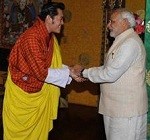During his address to the Parliament of Bhutan Prime Minister Narendra Modi spoke about Gross National Happiness (GNH) being an indicator that the leadership of that country “is concerned about the last man in the line”.
Uplift of every last person has always been intrinsic to the term GNH which was coined in 1972 by the then King of Bhutan Jigme Singye Wangchuck. However, the true global importance of GNH lies in the fact that it defines progress in ways that blend the material and spiritual-emotional facets of life.
When the term first appeared on the world stage in the late 1990s, GNH was dismissed as a fuzzy qualitative concept which cannot compete with Gross National Product (GNP), which is a quantitative measure of material transactions.
Much has changed since then. The Bhutanese now have a GNH Index which is used to produce progress reports. The domains and indicators that this report lists could potentially shift the definition of prosperity from money-related services and resources, to a well-rounded sense of human well-being.
The list of GNH domains and their indicators is worth a closer look:
*Psychological wellbeing – life satisfaction, emotional balance and spirituality.
*Health – self-reported health status, healthy days, long-term disability and mental health.
*Education – literacy, educational qualifications, knowledge, and values.
*Culture – language, artisan skills, socio-cultural participation and Driglam Namzha – the official formal dress code.
*Time use – working and sleeping hours.
*Good governance – political participation, political freedom, service delivery, government-performance, community vitality, social support, community relationships, family, victim of crime.
*Ecological diversity and resilience – pollution, environmental responsibility, wildlife, urban issues, living standards, household income, assets, housing quality.
Using this check list in striving for growth and security is a key challenge not only for India but this entire region. Cooperation with specific neighboring countries, while vital, can take us only so far. What is really worth striving for is a Gross Sub-continental Happiness.
Rajni Bakshi is the Gandhi Peace Fellow at Gateway House: Indian Council on Global Relations.
This blog was exclusively written for Gateway House: Indian Council on Global Relations. You can read more exclusive content here.
For interview requests with the author, or for permission to republish, please contact outreach@gatewayhouse.in.
© Copyright 2014 Gateway House: Indian Council on Global Relations. All rights reserved. Any unauthorized copying or reproduction is strictly prohibited


